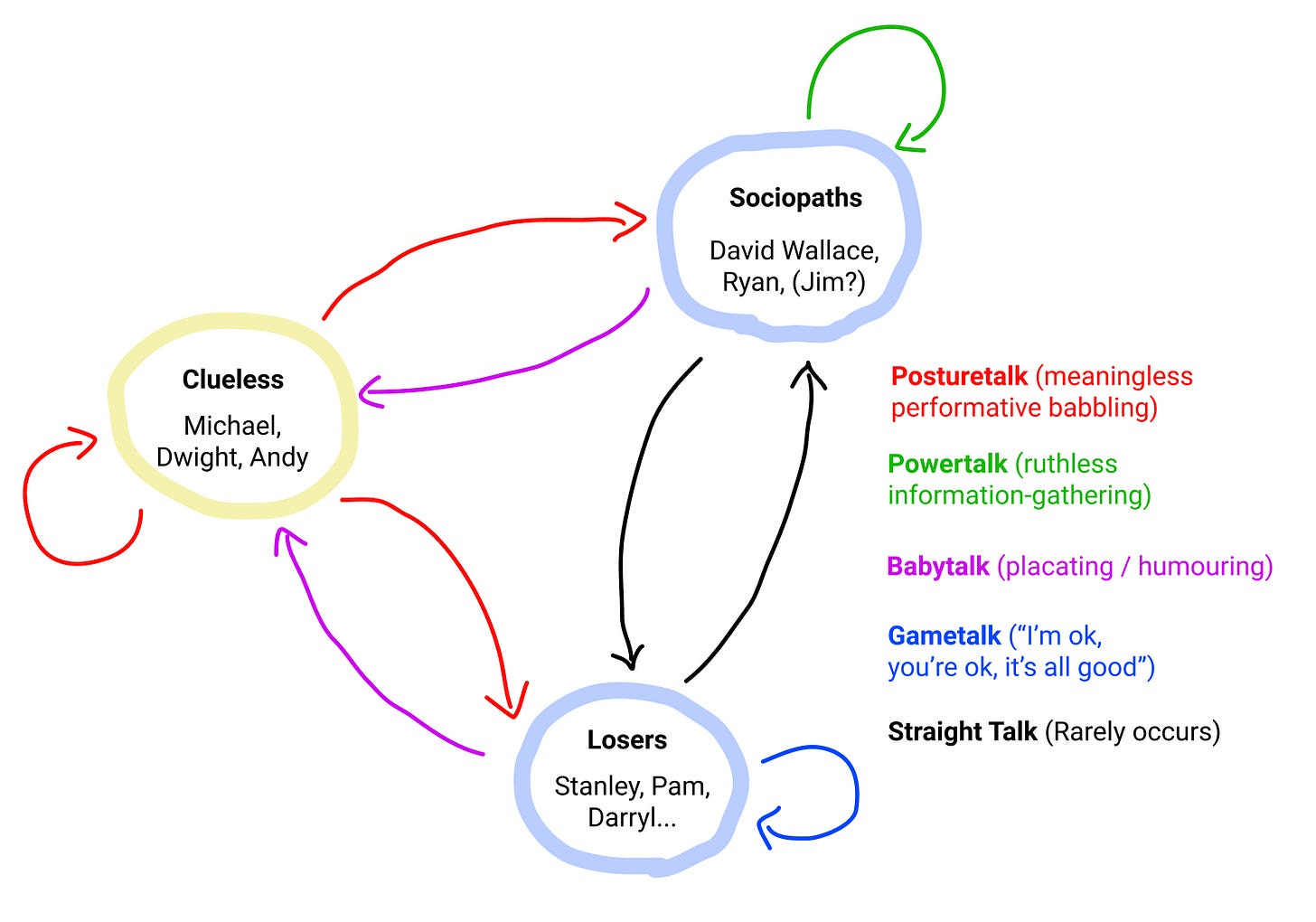The End of Serious Business Models
Will we all end up in the "edutainment" business?
Trying to strategize about the future of AI is an inherently pointless exercise but that’s what makes it so irresistible.
We have very quickly gone from
How do I create a lasting 30-year business? [2010]
to How do I make the most of the AI gold rush over the next 2 years? [2024]
to How do I not get fired? [2025].
As always, some people are not worried. These are exactly the Educated Gentry in the Michael Scott Theory of Social Class.
The Educated Gentry of “deep thinkers” still believe in the beautiful uniqueness of human consciousness and think AI is effectively a way to augment their superior reasoning abilities with context of the world’s knowledge so they can write more New York Times columns or whatever.
(I’ll admit I'm not fully immune from this form of optimism either.)
But for the rest of us, it’s important to reconsider what this means.
The natural safety net is to build things of defensible value, ,to build moats.
MOVE FAST
The default post-AI take is that speed is the only moat that matters now.
I've had similar but much more tempered thoughts on how the impact of traditional moats is reducing in Are Protocols Defensible in the Age of AI?:
Static moats are becoming weaker and choosing and betting on the correct futures requires careful consideration.
But moving fast is an easy moat to talk about because it’s baked into the mathematics of business.
Time is a primary inverse factor in cost of capital so speeding things up generally improves investor returns.
(If you squint hard enough, business is all about exceeding investor expectations.)
The real question is which companies will be in the position to execute better than others?
AGGREGATING INNOVATION
So far, the market has been surprisingly meritocratic.
Fresh-faced and energetic Founders with limited resources have had the ability to out-execute entrenched competitors and build rapidly growing companies.
But if everything can eventually be automated, why not innovation itself?
It’s possible that we will see a rise of “super-aggregators”, companies that build company-scale abstractions: agents that are able to develop new companies from scratch.
Coding is already highly disrupted by AI. PRDs (Product Requirement Docs) are actively being written by LLMs too. Soon, agents will be able to gather feedback and drive product vision and growth.
At that point you'd expect a small set of companies to have the best innovation pipelines, which in turn should reinforce their advantages even further.
This would work for products that are easily substitutable, effectively anything that solves a real customer problem but doesn't rely on a physical or otherwise scarce resource such as permits, cornered resources, etc.
But other more utilitarian services could see a self-reinforcing flywheel where companies with the best innovation pipelines build the best products → get all the customers → get the best feedback and → build even better products and innovation pipelines.
It’s scary.
CAN DISTRIBUTION SAVE US
The alternative option is to focus on distribution and trust: the brand above the product.
But in a world that rewards distribution above all else, business activities converge to performative edutainment.
In that world, talking about doing the thing becomes more important than doing the thing.
(This is already how Gen Z builds companies BTW and they are crushing it. Heard of Cluely?)
Whether you call it the Passion Economy, the Creator Economy, the rise of distribution as a moat or something else, it all points to the same thing.
The way to succeed is to get people to enjoy buying from you.
Especially cool if the things they are buying are not intrinsically more valuable than what they could get elsewhere.
UTOPIA VS. DYSTOPIA
The dystopian version of this world is pretty grim.
It would imply that to do something the market values, we’ll have to produce a Truman Show of our lives for an ever shrinking number of patrons who will control a majority of resources.
The more utopian lens is that this is a form of post-AI retirement where humans get to happily do the thing they love and live in abundance AND support each other.
I look aspirationally at people like Craig Mod who present an example of this “passion economy” utopia.
After failing to secure more traditional publishing arrangements with magazines and publishers, Craig launched a $10/month subscription to support his book projects which describe his walks around Japan. It’s called Special Projects.
The thing that stood out from other membership or subscription programs is that Craig is not trying to justify the value.
Instead he doesn't want anyone to sign up for the perks; he wants members to sign up to support him making more books because that’s what he will do.
In his thoughtful annual reflections, he’s written about how instead of hosting seminars, workshops and other valuable educational multimedia about how to make books, he just makes books and records stuff along the way.
He now makes hundreds of thousands of dollars per year from memberships and more from books.
A world where everyone is an influencer scares me.
But a world where everyone builds the things they want to see and we celebrate the process and creativity behind it sounds incredible.
While execution will undoubtedly rule, hopefully craft won't be far behind.





